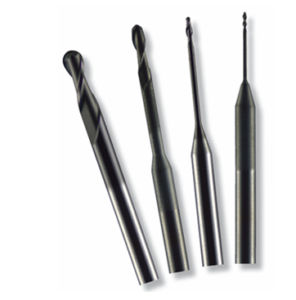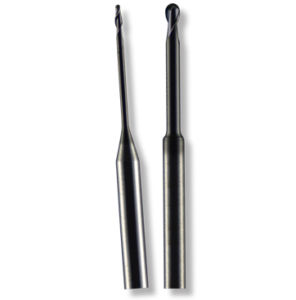In the first of a series of special dental blog posts, Roland DGA Product Manager for Dental Solutions, Dwight Blair, offers a quick tip for dental milling machine owners about matching the right milling tools with the correct materials.
Choosing The Best Tools for the Best Results
After selecting the material for your milling job, a number of questions typically arise: What tools should I use for zirconia, wax, PMMA, or tougher materials like composite resins and lithium silicates? How many units can I mill before those tools need to be replaced? Are all tools created equal and will they work with my current mill? While it’s a great idea to have a wide selection of quality tools on hand, let’s focus specifically on the best tools to use with Roland DG DWX series mills.

Carbide tools work quite well with PMMA, wax and other soft materials.
Most Affordable is Not Always Most Effective
Naturally, when deciding on a milling tool, the tendency is to lean toward a more affordable option, such as a carbide bur. Carbide tools actually work quite well with PMMA, wax and other soft materials, while still providing bur longevity. However, cleaning your carbide tools on a regular basis is a must to ensure optimum performance. Because milled wax and PMMA materials can potentially stick to the flutes upon cooling, it’s important to remove any remaining materials from the bur tip after each job. Of course, if you’re working with a material like zirconia using a carbide tool, be aware that doing so is likely to shorten the tool’s lifespan.

Diamond tools produce high quality prosthetics with superb margin lines and also extend tool longevity.
Diamond is a Lab Technician’s Best Friend
So, if a carbide bur isn’t the best choice for milling zirconia, what type of tool is right for the job? We recommend a diamond tool. Using a diamond tool will not only help produce high quality crowns, bridges and inlays with superb margin lines, it will extend tool longevity as well. For other tough materials, such as composite resins or hybrid ceramics, Roland DG offers a set of hybrid tools that’s perfect for the assignment. Roland DG’s hybrid tools are also the only tools approved for dry milling VITA Enamic material. If you use any other tools, a wet-grinding process will be necessary.
Roland DG milling tools by Sierra Dental, available for purchase at the Roland DGA store, will deliver the hand-crafted quality and longevity you’re looking for regardless of the material being used. You can expect outstanding results, and up to 10 times greater productivity out of each set.

